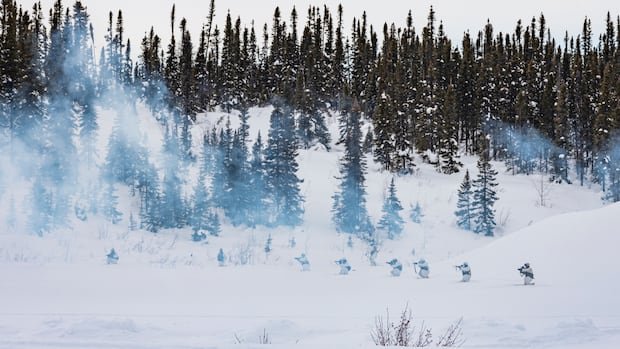Canada is planning to enhance its military training activities in the Arctic by increasing the deployment of various forces in the region for up to 10 months annually, starting this year, as confirmed by the military’s operations commander. Lt.-Gen. Steve Boivin announced that the renowned Far North exercise, Operation Nanook, will be expanded with additional elements to ensure a more consistent presence in an area that is becoming a focal point of geopolitical competition.
According to defense expert Michael Byers from the University of British Columbia, this strategic move presents a unique opportunity for the Liberal government to showcase Canadian sovereignty in the Arctic and unite NATO allies in support of the nation. Byers suggests that inviting major allied nations to participate in larger numbers would demonstrate solidarity, especially given recent indications from the Trump administration about exerting economic and potentially military pressure on Canada and Greenland.
Boivin mentioned that involving allies in the plan is a consideration to be made strategically, with the primary objective being to increase the presence of Canadian military personnel, warships, and aircraft in the Arctic. The aim is to establish a near-permanent Canadian presence in the region, with plans to extend operations to cover more than 10 months a year, compared to the current five to six months under Operation Nanook.
The Liberal government has emphasized its commitment to the Arctic by appointing a dedicated minister and allocating an additional $420 million to the Department of National Defence for sustaining a stronger military presence in the Far North. The decision to expand Operation Nanook was made before the funding announcement, with military personnel instructed last September to develop a revised schedule including seven training regimes annually, up from the usual four.
The first exercise under the new training plan, Operation Nanook-Nunalivut, was conducted in February near Inuvik and the Mackenzie River Delta, Northwest Territories, involving 450 Canadian troops and around 110 armed forces members from several countries. Byers highlights the significance of including allies in these exercises, suggesting that leveraging their presence could further benefit Canada’s interests amid current geopolitical challenges.
The importance of not excluding the United States from Arctic activities is emphasized by Byers, who believes that extending invitations to the U.S. military and coast guard, and having them accepted, could serve as a strategic move against challenges to Canadian sovereignty. By demonstrating leadership and consent through international collaborations, Canada aims to strengthen its position in the region.
While Canada has hesitated to host large-scale NATO exercises in the Far North, discussions have surfaced in defense circles following past visits by NATO officials. The potential for increased allied participation in Arctic operations is seen as a morale boost for NATO and a way to bolster Canadian and European security cooperation.
Concerns have been raised about the silence from certain allies regarding threats to Canadian sovereignty, notably from the U.S. President. The need for unity among nations, particularly in Europe, is stressed as crucial for maintaining security amid evolving geopolitical dynamics. The possibility of King Charles opening the Canadian Parliament session later this month and the impact of a greater NATO role in the Arctic are highlighted as significant factors in shaping international perceptions.
A greater NATO role in Arctic operations would not only signal unity and support for Canada but also demonstrate a broader commitment to Euro-Atlantic security, ensuring that Canada remains integrated within the international security framework.

